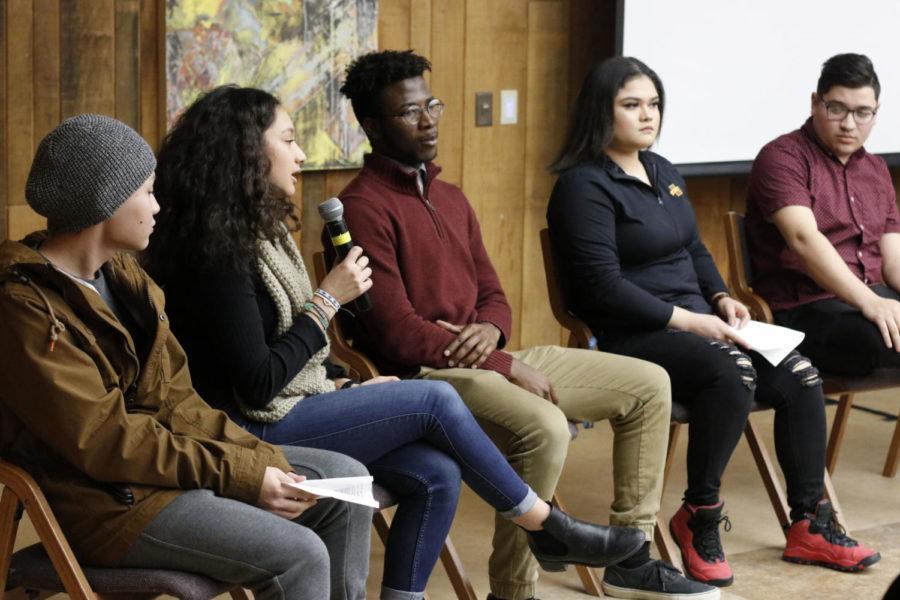2:10 to 3 p.m.: Exploring identity through film: a day in the life of an MVP Scholar
Gillian Holte/Iowa State Daily
Multicultural Visual Program scholars share their experiences with the program. The 19th Thomas L. Hill Iowa State Conference on Race and Ethnicity (ISCORE) was held in the Memorial Union Friday. The event focuses on issues of race and ethnicity on a local and national scale.
March 1, 2019
Two Multicultural Vision Program (MVP) scholar graduate assistants presented about the MVP program and the documentary assignments.
Jessica Mena Flores, a graduate assistant in the office of multicultural student affairs and Andrew Jessip, a graduate assistant in the office of multicultural student affairs first-year scholars and the multicultural vision program presented “exploring identity through film: a day in the life of an MVP scholar.”
As a part of the first-year seminar, University Studies 101B, Multicultural Vision Program scholars spend the semester “exploring various strategies for academic success and engaging in dialogue about self-discovery,” according to the program.
The MVP program is a full-tuition scholarship that is granted to 100 incoming multicultural students each year.
The students must be direct-from-high-school multicultural students who are U.S. citizens or permanent residents and residents of the state of Iowa as well as demonstrate academic potential that goes beyond grades or test scores.
The class has three theoretical frameworks: Yosso’s Community cultural wealth, critical race theory: counter narratives and Brofebrenner’s ecological systems theory.
As the final assignment for the course, the students create a short documentary to “reflect on the impact that their social identities have on their Iowa State University experiences.”
Flores and Jessip showed a few of the documentaries.
In the first documentary, students held up signs with a description of part of their identity. Some included race, age, gender, religion and personality attributes. The documentary also spoke about privilege and the privileges each of them have. The third topic of the documentary was power. Some of the power the students stated they had included the power to make money from art, be a CEO and more.
“Our identities, powers and privileges make us who we are,” they said in the documentary.
The second documentary started with personal stories on how the MVP scholarship impacted the students. The students also spoke about their social lives on campus and how they meet new people as well as about what lessons they learned from the class. Time management and reflection on small wins were two of these lessons.
After the films were shown, a panel of MVP scholars answered questions about their experiences.
The questions included “What three things have you learned about yourself throughout the MVP seminar classes and/or the documentary project,” “What are three major takeaways you have learned from the MVP seminar course,” “How have your identities shaped your experience at ISU,” and “How do you believe your learning as an MVP scholar will help shape you positively impact your community?”
The last question asked the panel to complete a sentence.” Because of MVP, I am … and I will …”
Some of the responses included “because of MVP I am empowered and I will empower others” and “because of MVP I am strong and I will finish what I have started here.”
















